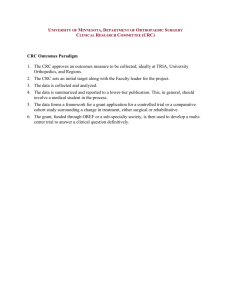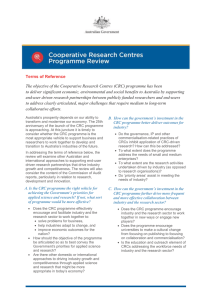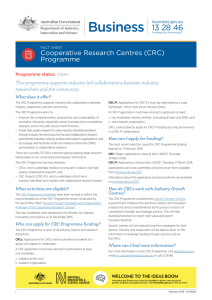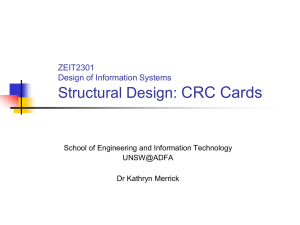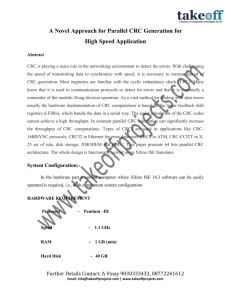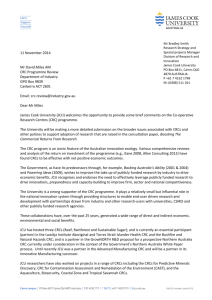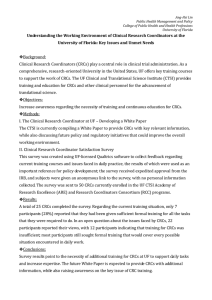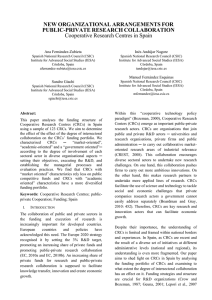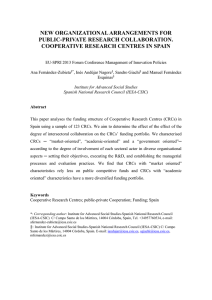CRC Guidelines Workshop Presentation
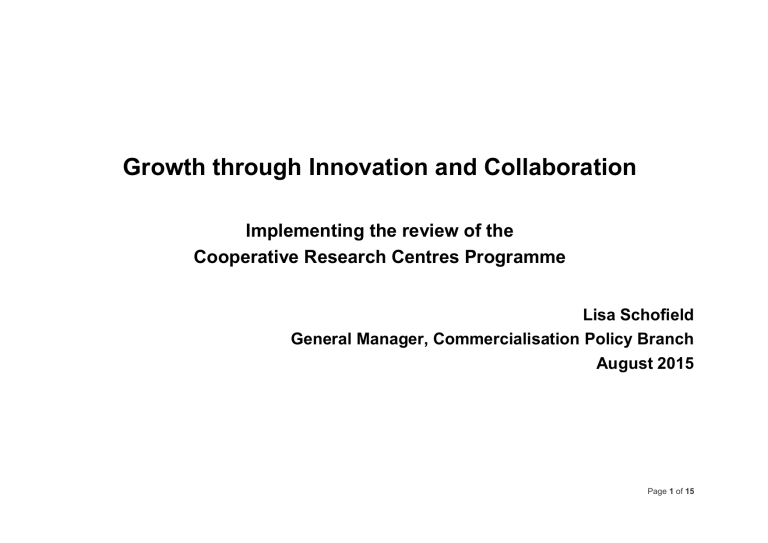
Growth through Innovation and Collaboration
Implementing the review of the
Cooperative Research Centres Programme
Lisa Schofield
General Manager, Commercialisation Policy Branch
August 2015
Page 1 of 15
Policy intent & programme objectives
Strategic policy
Support science and commercialisation
Enable growth and productivity for globally competitive industries
Objectives
Improve competitiveness, productivity and sustainability of Australian industries, especially…including the recently announced growth sectors, and in line with
Australia’s science and research priorities.
Establish and support industry-led, outcome focused collaborative research partnerships between industry and research organisations
Conduct high quality research to solve industry problems
August: Consultation to inform changes to guidelines
Sept/Oct: Drafting guidelines and reviews of CRCs
November: Guidelines finalised; expected release end Nov
Page 2 of 15
Revising CRC Programme Guidelines:
Key topics covered in this presentation
New Governance
CRC Advisory Committee
New focus
“Solving industry problems”
Address science & research priorities
New Guidelines
Key changes and questions for revised guidelines:
Eligibility criteria
CRC-P design
Selection criteria
Simplifying and streamlining processes
Links with Growth Centres
Page 3 of 15
Revising CRC Programme Guidelines:
Eligibility Criteria (CRC)
Definition of Industry
Current programme requires an “end-user”
Definition of Research organisation
Current programme requires a “higher education institution (or a research institute affiliated with a university)”
Extensions: None
CRCs limited to a maximum of 10 years with no extension of funding
This will apply to existing and new CRCs
New:
A new CRC must clearly demonstrate they are new
Page 4 of 15
Revising CRC Programme Guidelines:
Eligibility Criteria (CRC-Project)
Definition of “acceptable entity”
The entity responsible to deliver the project
Must be an industry partner in the collaboration
Page 5 of 15
Revising CRC Programme Guidelines:
CRC-Project design
Industry led project
Should include at least two Australian industry partners, including at least one
SME, and at least one Australian research organisation
Industry-focused research programme with tangible industry outcomes
Extent to which the CRC-P delivers on outcomes in growth sectors will be a consideration in assessment
Up to a maximum of 3 years – no extension
Funding of up to $3 million available, on a matched basis (cash and in-kind)
Page 6 of 15
Revising CRC Programme Guidelines:
Selection Criteria
1. Need for Funding / Additionality
Applicants must explain why the industry challenge would not be addressed without Commonwealth government (CRC) funding
Only applicants that demonstrate a ‘Need for Funding’ will be considered further
2. Research Programme
Proposals must solve a well-defined industry challenge/s and explain how the proposed research activities will address that challenge.
3. Industry Outcomes
Proposals must clearly articulate tangible industry outcomes expected to derive from the research activity. This includes describing the proposed commercial potential of the outcomes and any spill-over benefits
Page 7 of 15
Revising CRC Programme Guidelines:
Selection Criteria cont’d
4. Governance & Management Capability
Applicants must demonstrate principles of good governance and appropriate levels of expertise in project management; business management; commercialisation management and relevant market sector/technology
5. Education and Training Programme
Proposals must explain how they contribute to capacity and capability building in related industry and research sectors
This criterion is not mandatory for CRC-Ps however a strong response to this criterion will be looked upon favourably
Page 8 of 15
Revising CRC Programme Guidelines:
Selection Criteria cont’d
6. Value for money
Proposals must demonstrate the level of grant funding required and how it will be used; why the Commonwealth should invest in the CRC or CRC- Project
7. National Benefits
The extent to which the proposal aligns with the growth sectors; Australia’s science and research priorities; and improves Australia’s competitiveness in the global economy and spill over benefits
Page 9 of 15
Revising CRC Programme Guidelines:
Streamlining Processes – CRC Selection Round
Stage 1: Short proposal providing the following:
Brief response against selection criteria
List of participants including level of commitment
Basic data such as grant funding, term, key personnel etc
Stage 2: Full business case, including but not limited to:
Detailed statement of claims against the selection criteria
Detailed budget including participant contributions
Interviews
Impact Tool
Key staff including roles, responsibilities and experience
Page 10 of 15
Revising CRC Programme Guidelines:
Streamlining Processes – CRC-Projects Selection Round
Single stage online application process
Application will be a streamlined smart form hosted on business.gov.au
Applications to address the following:
Detailed statement of claims against Selection Criteria
Detailed budget including participant contributions
Milestones
Basic input costs, usage costs and impacts
Page 11 of 15
Revising CRC Programme Guidelines:
Streamlining Processes – CRC/CRC-Project Reporting
Reporting requirements for CRCs and CRC-Ps.
Potential areas for streamlining include:
Quarterly reports
Annual reports, including the Management Data Questionnaire
First year reviews
Performance reviews
Contract variations
Transition plans
Exit reports
Consideration of post-reporting
Page 12 of 15
Revising CRC Programme Guidelines:
Links with Industry Growth Centres
The Review report recommended CRCs and Growth Centres be aligned and work together
Growth Centres will set a 10 year strategy for the sector, and CRCs in relevant sectors will be expected to link with Growth Centres.
CRCs will be the engine of innovative research supporting the work of the Growth
Centres to drive productivity and competitiveness.
Reviews of current CRCs will identify linkages between CRCs and Growth Centres and recommend appropriate engagement strategies, noting that existing CRCs have funding agreements and research programmes in place.
New CRCs and CRC-Ps in the sectors will need to identify how they link and contribute to the outcomes of the Growth Centres.
Page 13 of 15
Revising CRC Programme Guidelines:
Summary for feedback
Eligibility Criteria
Definition of industry
Definition of research organisation
Definition of acceptable entity
CRC-P design
How do you think CRC-Ps should work?
Selection criteria
Simplifying and streamlining processes
Which areas of reporting would you like to see streamlined/simplified?
Links with Growth Centres
Page 14 of 15
Department of Industry and Science
Industry House
10 Binara Street
Canberra City, ACT 2601, Australia
Telephone +61 2 6213 6000
Page 15 of 15
